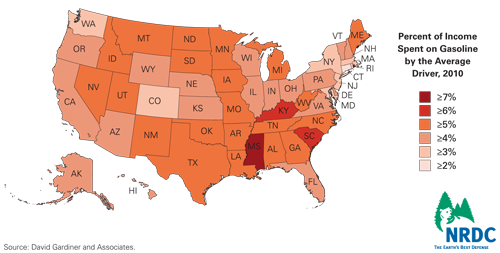
It's no secret that higher gas prices are hitting American pocketbooks hard. To a remarkable extent, however, exactly how much pain Americans are experiencing is a function of where they live.
A report released today by the Natural Resources Defense Council details how geography impacts our vulnerability to gas price fluctuation.
Fuel pump pressure is most pronounced in Mississippi, where in 2010 residents spent an average $2,225 fueling up, or more than 7 percent of their income. Meanwhile, Connecticut dwellers were far better situated. Residents of this tiny Northeast state spent less than 3 percent of their income fueling up last year, or about $1,586.
The analysis found that motorists in the American Southeast fared worst, overall. South Carolina, Kentucky and Georgia registered the second, third and fourth highest-paying positions, followed by rural Idaho. Study authors attributed this to a regional orientation toward sprawl and less fuel efficient vehicles, among other factors.
Meanwhile, consumers in the Northeast suffered the least as gas prices soared. New York, Massachusetts and Rhode Island followed Connecticut as the lowest spending states, with bike-friendly Colorado occupying the fifth position.
And in the first months of 2011, regional disparities have gotten even worse, the report found. April gas prices alone meant that Mississippi residents were spending a whopping 11 percent of their income on gas.
"Many Americans are locked in to paying high prices for gas," said study author Deron Lovaas in his blog. "They have limited or no access to public transit. They drive old, gas-guzzling cars they can’t afford to replace. They are forced into lengthy commutes by growth management policies that encourage building homes far from jobs. Their employers do not allow telecommuting or public transit benefits, but instead offer free parking."
The study highlights how ordinary people suffer when state policies reinforce car dependence. NRDC examined which states were making the biggest strides to free their residents from fuel pump slavery. Strategies for improving oil dependence included incentivizing electric vehicles as well as improving transportation system efficiency by enacting growth management strategies and instituting anti-idling regulations.
Seventeen states have some policy that restricts idling time. Sixteen states have smart growth or growth management policies in place, the report noted. Three states -- Washington, New York and Oregon -- have established policies aimed at reducing overall vehicle miles traveled.
California, Oregon and Massachusetts got credit for doing the most to reduce citizens' vulnerability to fuel price fluctuation. Nebraska, North Dakota and Alaska, on the other hand, were found to be doing the least to help residents cope.
"The states have a lot of work to do," said Lovaas. "Those at the top, the best thing you can say about them is they're valedictorians of a remedial class."
There is a big role for the federal government to play as well, Lovaas said. Among the NRDC's recommendations is making a fix-it-first policy part of the transportation bill reauthorization and establishing a 60 mpg fuel efficiency standard for new cars by 2025.





